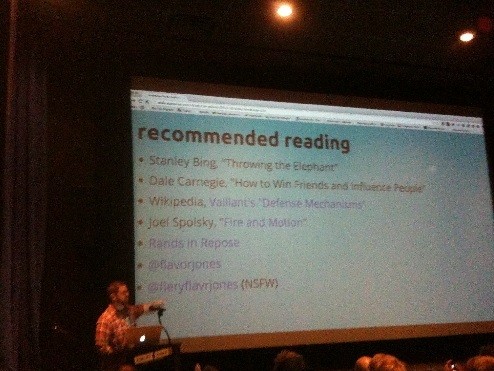Developers Learn How to Stay Agile at Daylong Jersey Shore Conference, Part 1

The yearly Asbury Agile conference, held in Asbury Park, brings together a host of developers and others to network and learn from experts. The conference is organized by Kevin Fricovsky of Monty Lounge Industries; Bret Morgan of Bands on a Budget; Jersey Shore Tech Meetup; and Cowerks, the coworking space (Asbury Park).
NJTechWeekly.com stopped by the event Oct. 2, 2013, which this year took place at The ShowRoom, a venue that runs indie films. We are always impressed by the Jersey Shore tech community’s high level of engagement. The event, which took place on a warm, sunny day, had a waiting list. There were no empty chairs, and the audience had excellent questions for the presenters.
The main Asbury Agile sponsors were two tech companies in the area — iCIMS (Matawan), a maker of talent acquisition software, and Marathon Data Systems, which provides field force automation solutions — although a host of N.J. tech companies and supporters helped make the conference possible.
We arrived just as attorney Herb Moore of SorinRand (East Brunswick) — a law firm that specializes in tech startup company needs — was about to finish his presentation, “10 Things Your Startup Lawyer Should Tell You.”
One such item: if you are planning to raise capital from investors, don’t incorporate as a limited liability company (LLC). Another: nail down your IP ownership early so you ensure, for example, that none of the founders’ prior employers has rights to the startup’s IP.
After Moore spoke, the group heard a lightening talk from the startup Score Zone, based at Cowerks, whose app connects Shore Conference NJ fall football fans to real-time scores and commentary. Craig Phares, cofounder, reminded the audience that apps that keep sports news, especially high school scores, hyperlocal can be very compelling.
The app crowdsources scores from game attendees. A rating system similar to the one used by eBay provides a built-in accuracy meter, he explained, and it can scale to other areas and conferences and other high school sports.
After Phares spoke, Mike Dalessio, a Madison resident who is director of Pivotal Labs (San Francisco) New York office, gave the presentation “Enterprise-fu, or How to Succeed in Business,” based on his considerable experience as a tech developer at enterprise companies. His presentation was aimed at developers and others working in the big bureaucratic firms who want to bring agile attributes to their work.
Said Dalessio, “It is a battle. You are always going to be battling against somebody or some process in the enterprise.” He noted that it seems “enterprise companies like their processes more than they like individuals and interactions. They love documentation maybe more than they like working with software.”
Dalessio provided suggestions for how to handle workplace politics. Programmers should learn how people respond when they are stressed. He advised they learn to empathize with people who say no so they can get them to do things their way.
At the same time, said Dalessio, developers should be delivering value as often as possible. “Don’t spend a lot of time talking about what you are doing; just put your head down and do it,” he said. That will allow you to accumulate a lot of small wins. If you moderate your expectations and obtain enough small wins, they will add up to big ones, he said.
Dalessio advised hiring for brains and personality, not just skills. The short reason for this is that your team will have to do other people’s jobs for them, such as in quality assurance and human resources. You may as well as hire people who can learn all of this, he said.
Employees with a decent personality will support you. Welcome like-minded people from other parts of the organization, he suggested.
He also emphasized that it’s essential for programmers to learn how to say no. If you really believe the software is headed in the wrong direction and others are barking orders at you, find a way to not obey, he advised.
Referring to several books on the subject, he noted that one method is to do what you want to and when caught, say, “I thought you meant I should do this.” Another way to get the right thing done is to deliver software constantly, even if it isn’t what you were asked to do. It will keep the boss off balance, and you’ll build a better, more useful product, he said.
Finally, Dalessio advised trying to sneak funding for stealth projects into the budget when you have creative ideas that will benefit the company.
Marathon Data VP of engineering Eric Farr and a group of his employees discussed how the company has outgrown its current space in Wall and will be moving to a new facility in early 2014. The development space is being thoughtfully designed by the team to encourage agile work groups and programming. That means no permanent cubicles, furniture that can be moved around easily, easy-to-find collaboration space and colocated team leaders and quality assurance personnel.
It was noted that although collaboration is key to agile development, team members require some autonomy, so they need their own space as well.
“As a relatively young agile team in a company that has a more traditional structure, we are still feeling out our design,” one team member said, adding, “As with all things agile, you have to be willing to assess the merits of your decisions and … iterate on your decisions.”
[NJTechWeekly.com will cover more of the Asbury Agile conference in an upcoming article.]

